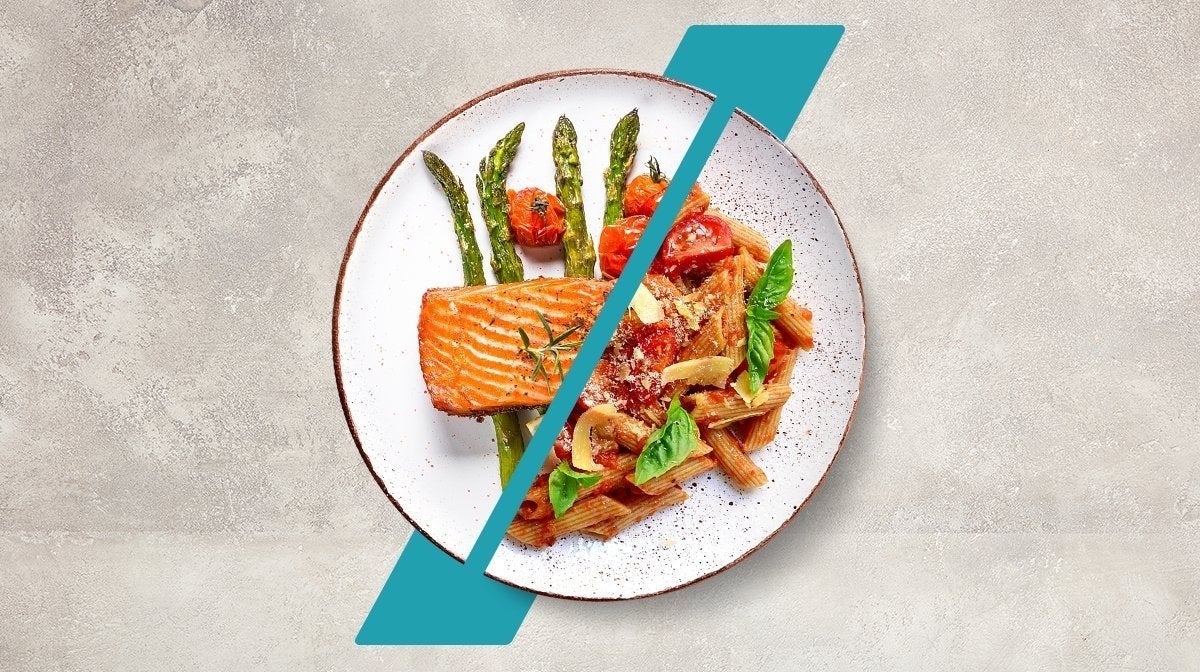What Is The Ketogenic Diet?

The “keto diet” or “keto lifestyle” has skyrocketed in popularity in the past few years. Short for “ketogenic diet”, it’s a diet that focuses on high fat intake with moderate protein and limited carbohydrates.1 The ketogenic diet has actually been around for years — originally discovered to be beneficial in reducing seizures related to medical conditions like epilepsy.1
However, it has become more popular for weight loss and exercise performance, spurring tons of keto-friendly food products and supplements. Here are the macro breakdowns for the standard ketogenic diet (SKD) and high-protein ketogenic diet:


How does the keto diet work?
How does a ketogenic diet work for weight loss? Our body’s typical, preferred source of energy is carbohydrates. Our muscles burn carbs (from our food or those stored as glycogen) to meet the demands of activity and exercise. When we severely restrict our intake of carbs, like with the ketogenic diet, our body is forced to find alternative sources of energy.2 When we limit carb intake, our metabolism can shift to burning fat for energy instead — a metabolic state called “ketosis”.
Summary : Since the keto diet is carb-restrictive, it encourages your body to burn fat for energy rather than carbs.

Keto health benefits
In addition to the treatment benefit of keto diets for seizures (which should always be done under a doctor’s supervision), there are many recent studies showing proven benefits for:
weight loss blood sugar control
When you consume carbohydrates, your body has to produce insulin to absorb and store that sugar.1 When you are not constantly eating carbs, your body doesn’t have as great a demand for insulin production, keeping blood sugar more stable.
Summary : The keto diet can assist with weight loss and blood sugar control, amongst others.
Things to consider
1. Eliminating food groups
2. Easy to slip up
If you see quick success with keto, but then slip into a regular pattern of unhealthy eating, you’ll likely gain back the weight just as quickly. The keto diet is especially hard to maintain because even one day of “cheating” or slipping up will take your body out of ketosis and lead to storing the extra fat, rather than burning it for energy.
3. Missing key nutrients
4. Keto flu
Getting started with keto can be difficult as well. Many people who start to follow this diet experience a different first few weeks as their bodies adjust to burning fat for energy instead of carbs, which it’s used to.
You will probably feel tired, irritable, with decreased mental and physical energy (especially for exercise). You’ll also probably find yourself hungry, craving carbs, and possibly struggle with sleeping and digestive issues. Keto flu includes poor energy and mental function, increased hunger, sleep issues, nausea, digestive discomfort and decreased exercise performance.
Summary : The keto diet can have numerous side effects, such as low energy, which normally disappear after the first couple of weeks.

Foods to avoid
When you are trying to attain a state of ketosis (burning fat for fuel), you have to limit the body’s quickest, default source of energy — carbs. To truly maintain a ketotic state, you have to consistently avoid foods which contain high levels of carbohydrates. This includes:
1. Sugary foods
Cookies Pasta Desserts - Sweets
2. Starchy foods
Breads Pastas Rice - Potatoes
3. High-sugar fruits
Bananas Apples Mangoes
Pears Grapes Cherries
Some low-sugar berries are allowed in small amounts.
4. Vegetables
Carrots Corn Peas Parsnips
5. Some dairy
Many
6. Beans and legumes
Beans and legumes (like lentils and chickpeas) are usually thought of as plant protein sources, they are high in starch and need to be avoided as well.
7. "Secret" carbs
There are other, less traditional sources of carbohydrates, which you may not think of. Things like
Although your main calorie source on a keto diet is fat, you want to choose your fats wisely and try to limit saturated fats (think lard, butter, mayonnaise) and trans-fats, like processed vegetable oils in baked goods.
Summary: Whilst on a keto diet, you should avoid foods high in sugar, such as sweets, bananas, peas and ketchup.

FAQs
Do I have to avoid carbs entirely?
When you want to achieve and maintain a state of ketosis, it’s important to consistently
Will I lose muscle mass?
Research on preserving muscle mass is mixed. If this is a concern for you, it’s better to follow the higher protein version of the keto diet. Often extreme, fast weight loss includes losing muscle mass as well as fat mass, but this will be different for each individual.
What if I am constantly tired?
You will most likely be tired for the first week or so on a ketogenic diet, as your brain and body are adjusting to burning fat for energy instead of carbohydrates. Because glucose is the muscle’s preferred energy source during exercise, you may also see some decline in performance early on in the diet (during the “keto flu” period). Trying to eat a variety of foods and choosing the healthiest fats and protein sources may help.
Is ketosis dangerous?
Using the keto diet as a temporary weight loss strategy shouldn’t be dangerous to a healthy individual, but everyone’s body may react differently to such an extreme change in eating patterns. However, staying in a state of ketosis, although hard to maintain, can be dangerous if you have underlying medical conditions — it’s best to follow this diet under a doctor’s supervision.
Can I build muscle on a keto diet?
Because the primary effect of a ketogenic diet is weight loss, and building mass requires extra calories, it’s difficult to build muscle during this period. Most often the higher protein option of the keto diet is followed to try to preserve muscle mass and performance, but muscles require energy to perform and protein to recover and repair. Keto isn’t the best option for someone trying to bulk up.
How do I know I’m in ketosis?
When your body is in a state of ketosis, there are ketone bodies circulating in your blood which are excreted in your urine. They also cause your breath to smell slightly sweet. These factors are hard to measure yourself. The best way to try to stay in ketosis is to adhere to the macro recommendations for the diet.
Take home message
While the keto diet offers promising weight loss results and other potential health benefits, it can be difficult to sustain in the long run. This is because it is very restrictive to food groups. It may not be the best choice for high-level athletes who don’t want to sacrifice performance or muscle mass. Because of the dramatic changes, it causes in the body, the keto diet is best followed under a doctor’s supervision.

Claire is a Registered Dietitian through the Academy of Nutrition and Dietetics and a board-certified Health and Wellness Coach through the International Consortium for Health and Wellness Coaching. She has a Bachelor of Science in Biology and a Master’s degree in Clinical Dietetics and Nutrition from the University of Pittsburgh.
Talking and writing about food and fitness is at the heart of Claire’s ethos as she loves to use her experience to help others meet their health and wellness goals.
Claire is also a certified indoor cycling instructor and loves the mental and physical boost she gets from regular runs and yoga classes. When she’s not keeping fit herself, she’s cheering on her hometown’s sports teams in Pittsburgh, or cooking for her family in the kitchen.
Find out more about Claire’s experience here.
1. Zupec‐Kania, B., & Zupanc, M. L. (2008). Long‐term management of the ketogenic diet: Seizure monitoring, nutrition, and supplementation. Epilepsia, 49, 23-26.
2. Wroble, K. A., Trott, M. N., Schweitzer, G. G., Rahman, R. S., Kelly, P. V., & Weiss, E. P. (2019). Low-carbohydrate, ketogenic diet impairs anaerobic exercise performance in exercise-trained women and men: a randomized-sequence crossover trial. The Journal of sports medicine and physical fitness, 59(4), 600-607.
3. Bueno, N., De Melo, I., De Oliveira, S., & Da Rocha Ataide, T. (2013). Very-low-carbohydrate ketogenic diet v. low-fat diet for long-term weight loss: A meta-analysis of randomised controlled trials. British Journal of Nutrition, 110(7), 1178-1187. doi:10.1017/S0007114513000548






